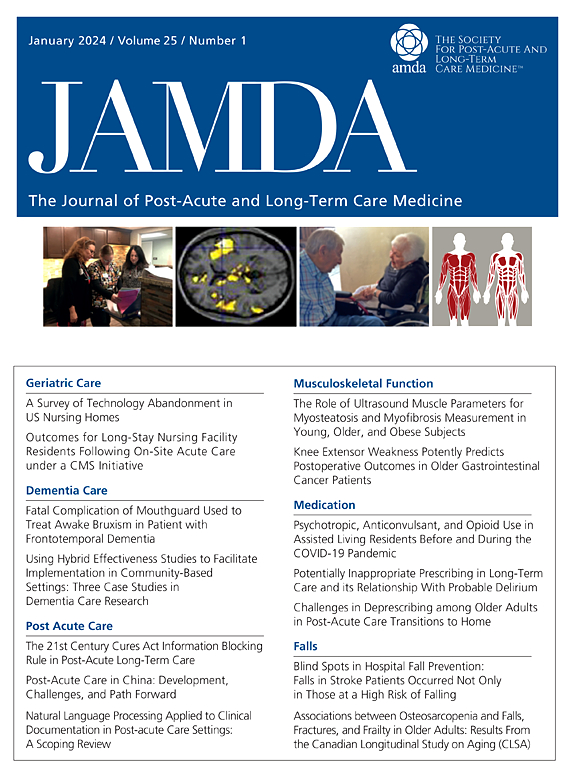Describing Dementia Specialty Care Units in US Nursing Homes: Leveraging National Survey Data From HARBORS and LTCfocus
IF 4.2
2区 医学
Q2 GERIATRICS & GERONTOLOGY
Journal of the American Medical Directors Association
Pub Date : 2025-02-08
DOI:10.1016/j.jamda.2024.105479
引用次数: 0
Abstract
Objectives
Nursing home dementia specialty care units are highly publicized as beneficial for residents with dementia, but we know little about these units and what makes them “special.” Leveraging primary data from a national survey of nursing home representatives and the LTCfocus data, this study aims to describe characteristics and features of dementia specialty care units and examine variations in nursing home quality ratings.
Design
National survey.
Setting and Participants
Nationally, 256 nursing homes were randomly selected. Surveys with questions about dementia specialty care units were mailed to nursing home representatives in September/November 2023.
Methods
A total of 166 surveys were returned from 126 nursing homes and compared with LTCfocus data. Descriptive statistics and qualitative analyses were used to analyze data.
Results
A total of 105 (83.3%) respondents corroborated with LTCfocus data (kappa = 0.67, P < .05) regarding presence of dementia specialty care units. Of 21 respondents (16.7%) not corroborating, inconsistencies were almost equal regarding directions of mismatching. Seventy-seven nursing homes had dementia specialty care units, 44% of which were rated 4 to 5 stars for quality. Nonprofit nursing homes had higher star ratings compared with for-profit nursing homes. Wander gardens, interactive technologies, and restraints were used less frequently than personalized music, communal dining, locked units, outdoor access, and visiting animals on the units.
Conclusions and Implications
Researchers using LTCfocus data to determine the presence of dementia specialty care units can be confident that designations are accurate. This study adds to our description of nursing home dementia specialty care units and provides insights into their presence in some nursing homes. Further research is needed to understand the relationship between profit status and quality ratings.
描述美国养老院的痴呆症专科护理单位:利用来自港湾和LTCfocus的全国调查数据。
目的:养老院痴呆症专科护理单位被高度宣传为对痴呆症患者有益,但我们对这些单位知之甚少,也不知道是什么让它们“特别”。利用来自全国养老院代表调查的原始数据和LTCfocus数据,本研究旨在描述痴呆症专科护理单位的特征和特征,并检查养老院质量评级的变化。设计:全国调查。环境和参与者:在全国范围内,随机选择了256家养老院。有关痴呆症专科护理单位问题的调查于2023年9月/ 11月邮寄给养老院代表。方法:对来自126家养老院的166份问卷进行调查,并与LTCfocus的数据进行比较。采用描述性统计和定性分析方法对数据进行分析。结果:共有105名(83.3%)受访者证实了LTCfocus数据(kappa = 0.67, P < 0.05)关于痴呆专科护理单位的存在。21名受访者(16.7%)没有证实,不一致几乎等于不匹配的方向。77家养老院设有痴呆症专科护理单元,其中44%的质量被评为4至5星。与营利性养老院相比,非营利性养老院的星级评分更高。漫步花园、互动技术和约束的使用频率低于个性化音乐、公共餐饮、上锁的单元、户外通道和访问单元上的动物。结论和意义:研究人员使用LTCfocus数据来确定痴呆专科护理单位的存在,可以确信指定是准确的。这项研究增加了我们对养老院痴呆症专业护理单位的描述,并提供了一些养老院存在的见解。需要进一步的研究来了解利润状况和质量评级之间的关系。
本文章由计算机程序翻译,如有差异,请以英文原文为准。
求助全文
约1分钟内获得全文
求助全文
来源期刊
CiteScore
11.10
自引率
6.60%
发文量
472
审稿时长
44 days
期刊介绍:
JAMDA, the official journal of AMDA - The Society for Post-Acute and Long-Term Care Medicine, is a leading peer-reviewed publication that offers practical information and research geared towards healthcare professionals in the post-acute and long-term care fields. It is also a valuable resource for policy-makers, organizational leaders, educators, and advocates.
The journal provides essential information for various healthcare professionals such as medical directors, attending physicians, nurses, consultant pharmacists, geriatric psychiatrists, nurse practitioners, physician assistants, physical and occupational therapists, social workers, and others involved in providing, overseeing, and promoting quality

 求助内容:
求助内容: 应助结果提醒方式:
应助结果提醒方式:


